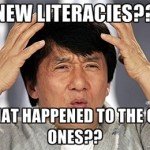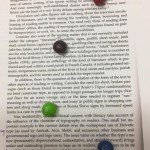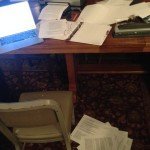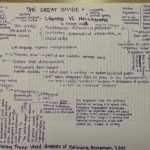Stuff & Things
We can use this page to share resources, ideas, or post questions for class.
Literacy in Composition Studies (LiCS) journal (open access)
Journal of Literacy Research (our library has access)
Sept 15
Sept 1
Literacy events serve as concrete evidence of literacy practices. Heath (1982) developed the notion of literacy events as a tool for examining the forms and functions of oral and written language. She describes a literacy event as “any occasion in which a piece of writing is integral to the nature of participants’ interactions and their interpretive processes” (p. 93). Any activity in which literacy has a role is a literacy event. As Barton and Hamilton (2000) describe, “Events are observable episodes which arise from practices and are shaped by them. The notion of events stresses the situated nature of literacy, that it always exists in a social context” (p. 8).
Barton and Hamilton (2000) describe literacy practices as “the general cultural ways of utilizing written language which people draw upon in their lives. In the simplest sense literacy practices are what people do with literacy” (p. 8). Literacy practices involve values, attitudes, feelings, and social relationships. They have to do with how people in a particular culture construct literacy, how they talk about literacy and make sense of it. These processes are at the same time individual and social. They are abstract values and rules about literacy that are shaped by and help shape the ways that people within cultures use literacy. Street (1993) described literacy practices, which are inclusive of literacy events, as “‘folk models’ of those events and the ideological preconceptions that underpin them” (pp. 12-13).
ways of describing literacy, literacy practices…
literacy as doing, as a social practice (Barton)
literacy as accomplishing things with reading and writing (Brandt)
People use literacy to present a particular kind of self. Literate practices served to mark social boundaries (Finders)
Literacy as the ability to read and write situates literacy in the individual person, rather than in society. The practices of social groups are never just literacy practices; they also involve ways of talking, interacting, thinking, valuing, and believing. Can not pull apart literacy practices from non-literacy practices. (Gee)
Learning to write means learning to write in the ways (genres) those in an activity system write (Russell)
Literacy as a set of socially organized practices, which make use of a symbol system and a technology for producing and disseminating it. Literacy is not simply knowing how to read and write a particular script but applying this knowledge for specific purposes in specific contexts of use. A piece of writing, whatever its form, serves as a flag to signal activities in the ongoing stream of behavior that may have some component skills in common (258). (Scribner and Cole)
Literacy as a shorthand for the social practices and conceptions of reading and writing. ideological model of literacy: concentrate on the specific social practices of reading and writing. significance of socialization process in the construction of meaning of literacy for participants (Street)
conceptions of practice
Scribner and Cole: By practice, we mean a recurrent, goal-directed sequence of activities using a particular technology and particular systems of knowledge. A practice consists of: technology, knowledge, and skills (236). Practice always refers to socially developed and patterned ways of using technology and knowledge to accomplish tasks.
Wenger: Practice is always social practice. Practice: Doing in a historical and social context that give structure and meaning to what we do. as soon as members have access to the practice, they find out what counts




